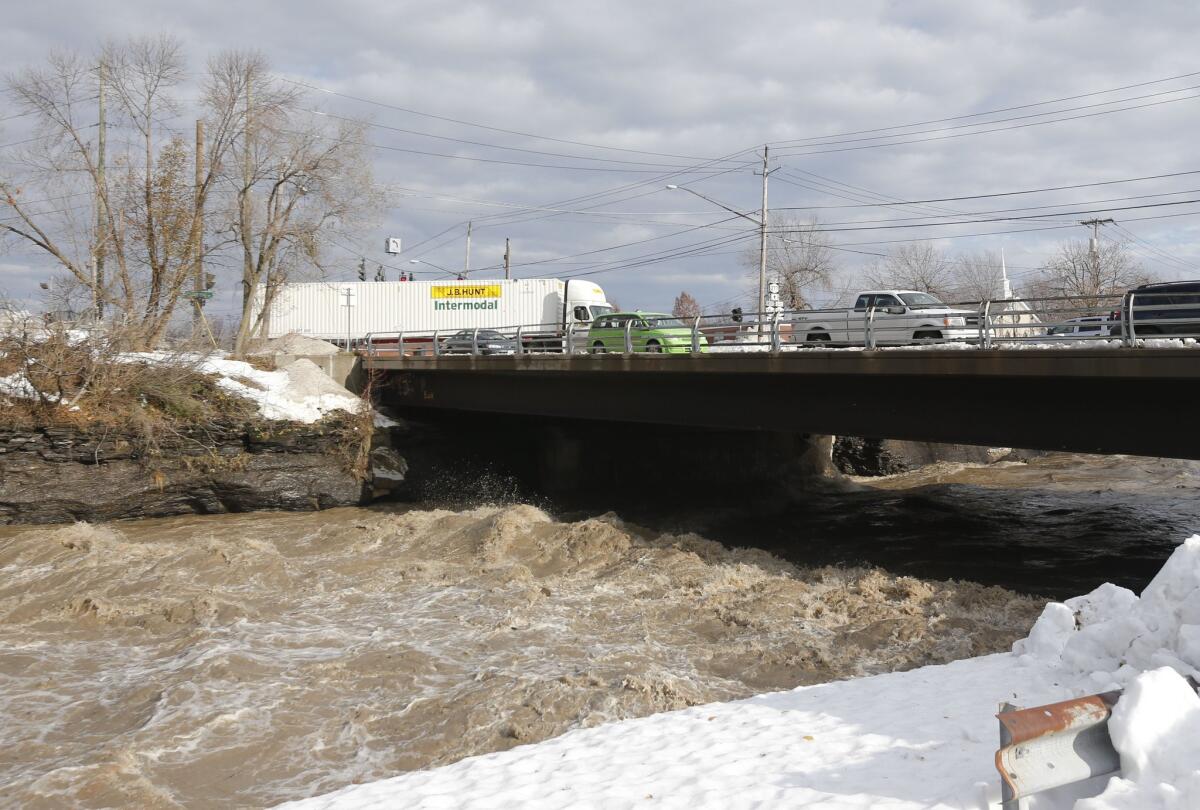Neither rain nor snow nor heat sways views on climate science

- Share via
Think that people in upstate New York will more strongly believe climate change is upon us after an early November blizzard dumped 7 feet of snow, which then was turned to slush by spring-like temperatures? Think again.
Freaky seasons and drastic weather anomalies do little to convince most people that climate change is real - political ideology does much more, according to a study published online Monday in the journal Nature Climate Change.
The study found that people who saw the winter of 2012 as warmer than usual were right – it was, on any time scale. But that conclusion did not affect their views on the science behind climate change.
The results further undermine a fundamental assumption that has driven science communication since a U.N. panel first announced, in 1990, that evidence pointed toward an increasingly warming Earth due to the buildup of greenhouse gases in the atmosphere.
People may be hesitant to accept the consensus view now, scientists and policy makers have since assured, but that will change when their local climate starts changing.
“There’s really little to no evidence of that” in the U.S., said sociologist Aaron McCright of Michigan State University, lead author of the study.
McCright found that Americans’ perceptions of aberrant weather patterns matched the data. But he found that those individual perceptions did little to drive how strongly people believed climate change was underway, caused by man, and constituted an immediate threat. Nor did that personal experience with abnormal climate influence whether Americans thought the scientific community agreed on those counts.
The scientific consensus on climate, outlined in the Intergovernmental Panel on Climate Change’s fourth report in 2007, is that “the warming of the climate system is unequivocal, as is now evident from observations of increases in global average air and ocean temperatures, widespread melting of snow and ice and rising global average sea level.”
It’s no surprise to anyone – least of all social scientists – that America is deeply divided along party and ideological lines about climate (and healthcare, among other topics). But a growing body of evidence now suggests that ideology interferes with the assessment of science.
For example, in a study published this month, a Duke University social psychologist showed he could strongly shift conservatives’ skepticism about climate change by associating the science with policies that either were antagonistic to their core beliefs (such as small government and unfettered markets), or aligned with them. Skepticism was higher when facts were presented in a context of government regulation, and lower in the context of free-market solutions.
Study co-author Troy Campbell, a doctoral student at Duke’s Fuqua School of Business, showed a similar shift in credulity among liberals with respect to crime statistics and gun ownership policies.
In other words, it appears that Americans are not coldly weighing the facts, then arguing over policy. Our ideologies and political affiliations are altering how we process facts. This example of “motivated” cognition appears to be driving denial of climate science, according to Campbell.
“People often say that we disagree about the facts, so that leads us to disagree about the solutions,” Campbell said. “But what’s actually happening is that people are disagreeing about the solutions, so we can never really have a good discussion of the facts. That’s a tragic story.”
Tragic, but all too familiar, McCright said. “It’s something that we see a lot,” he said of Campbell’s study. “Whether you call it confirmation bias or motivated cognition, it is a pretty robust finding across many different studies.”
McCright co-wrote another study, published this week, that matched more than a decade’s worth of polling by Gallup with a database of region-specific climate anomalies compiled by the National Oceanic and Atmospheric Administration.
The researchers ran about 800 computer models to complete the most comprehensive and specific analysis to date of how personal experience and perceptions of local climate anomalies affect beliefs about climate change.
“We searched high and low to find different ways that the climate extremes could impact people’s views of climate change and we found almost nothing,” McCright said. “We found that, sure enough, political ideology and political party affiliation are the two dominant predictors in our models, which is sort of depressing. But this is the reality in the U.S.”
On the up side, McCright said, people’s perceptions about freakish spells of weather do match the data – making it perhaps easier to talk about adapting to change, rather than about halting the warming trend.
Campbell, who is earning a marketing degree, suggests that divorcing descriptions of the problem from its potential remedies could filter out the interference of ideology, but he and McCright acknowledged that it is may be too late to do so on the topic of climate change.
The association between climate problems and remedies is far too strong and pervasive, and is reinforced by political leaders and the media, both said.
On that front, the news is not so good, either. A Pew Research Center study last month showed that there is little to no overlap between where conservatives and liberals seek news – at a time when ideologues of either stripe disproportionately drive public policy.
The middle ground is eroding, the Pew studies show. And these new studies suggest this change is washing away our ability to agree on facts.
“It’s like we have no common facts anymore,” McCright said. “And climate change is symbolic of that.”
For science worth fighting over, follow me on Twitter: @LATsciguy







